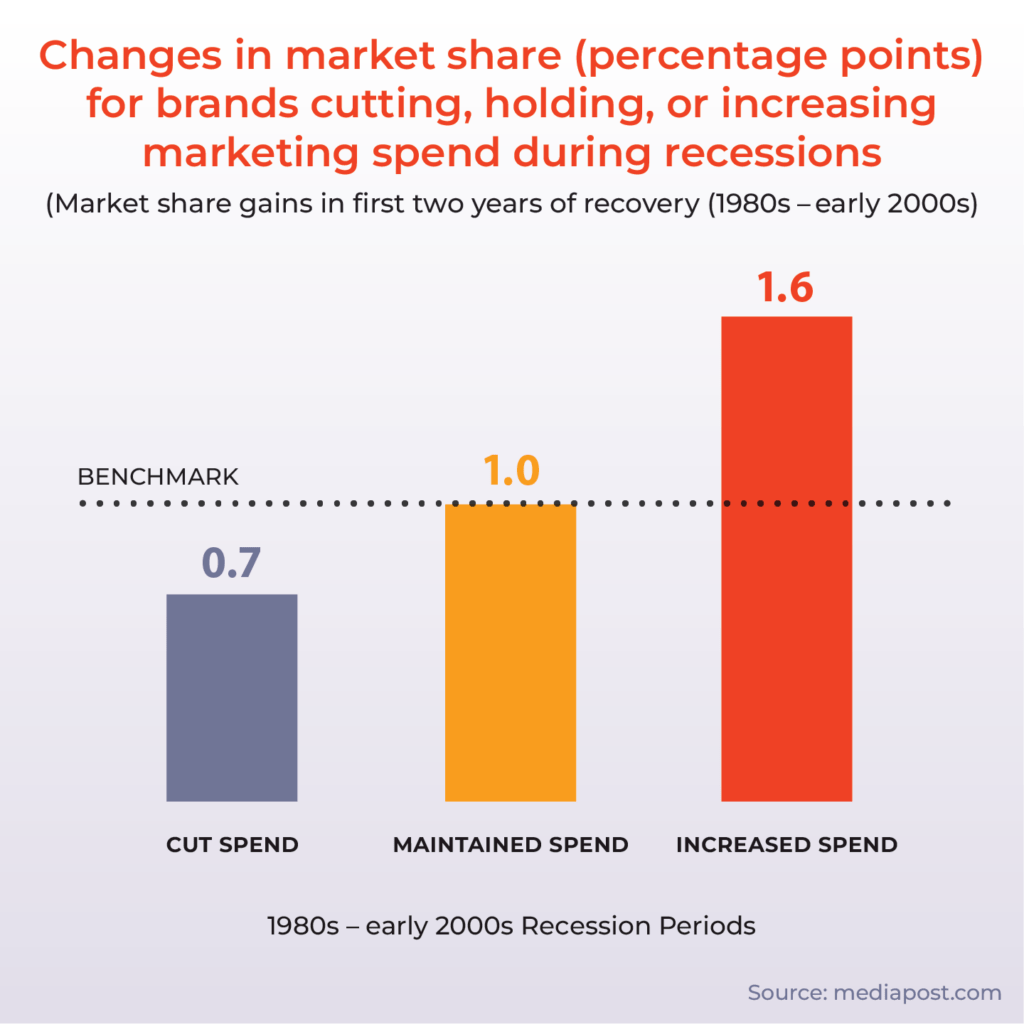According to top economists, a recession is expected some time in 2023, with the economy projected to remain depressed for up to a year and a half. Despite the cyclical nature of downturns, marketers often grapple with questions about how to allocate their resources during tough economic times. Should they reduce spending on brand promotion and prioritize pricing and offers? Let’s find out.
So, is it wise to shift focus from brand building and concentrate on short-term sales? This is a common question that arises during economic downturns. Experts agree that a company’s share of market (SOM) is closely tied to its share of voice (SOV); a pretty fundamental theory. If you reduce reduce your SOV, you risk losing SOM, and regaining it later can be difficult – but that doesn’t mean you shouldn’t be hyper-strategic on how you allocate your budgets.
Interestingly, after a recession, around 40% of companies cease to exist due to mergers, acquisitions, bankruptcies, and other factors. Most of these companies had cut prices and/or marketing budgets. However, companies that increased their SOV grew their sales and profits by about 20% more than the average. And companies that took a hard look at processes to find money to stay visible in the market or fund price-decreases and/or offers, saw sales and profits grow by 50% to 100% more than the average.
Since many major advertisers decrease spend during recessions, brands that continue to invest in advertising may experience even greater efficiency due to reduced competition for both media exposure and consumer attention. This usually results in better top-of-mind awareness for purchases, the ability to bounce back quickly after it’s over, and may even help you capture a larger market share.

Should I shift my focus from gaining new customers to retaining the ones I have?
Basically, it’s crucial to remain visible and connected with your customers, even if budgets need to be reduced to balance expenses. While brand investment should not be stopped entirely during a recession, it’s important to re-evaluate how it’s being done. For instance, combining products and merchandising them together can optimize marketing costs, and allow for price reductions on the individual products. Maintaining a strong connection with your existing customer base is actually pretty crucial to optimizing the customer lifecycle. As clients may be seeking more high-touch service (a hands-on, personalized approach to customer service), your marketing must be flexible enough to adapt to changing needs and shift channels accordingly. To stay customer-centric, it’s important to invest in the development of insights about the changing consumer and their unmet needs. This means seeing beyond the numbers and understanding what your clients are really going through. Recessionary times can drive people back to basics, and by focusing on value propositions and customer retention levers, you can ensure that your marketing efforts are aligned with the changing needs of your target audience.
In short, while there needs to be tighter fiscal discipline during a recession, it’s unwise to completely halt investment in your brand. Your brand is your best asset, and neglecting it will ultimately lead to a decrease in its value.
Making the Finance Team your closest ally can make all the difference.
All that being said, you’re also likely facing the fiscal responsibility pressures from within your organization. If you can demonstrate to your finance team how reducing brand awareness will impact your position in the consideration set over the next three years, they may be more receptive to reconsidering overly reduced spending. You know, take a scalpel to the budget versus a cleaver.
Consolidating data across all verticals using a customer data platform can enable marketers to adjust messaging based on real-time client triggers and campaign performance. In times of tighter budgets, you need to analyze data to find those important correlations and insights, understanding not only the outcome but also the cause. Customer considerations should never become a secondary priority. Engaging finance in the analysis of sales data, total marketing budget, and marketing performance can uncover historical correlations between marketing investment, revenue growth, and optimal budget allocation.
Tracking and responding to customer behaviour during a recession is critical to customer retention and long-term profit. Combined with a close eye on changing market conditions and client sentiment, these tools enable marketers to be more relevant and agile with messaging. As marketing funds become increasingly limited, the adoption and implementation of these tools will accelerate, directing spend where consumer demand is and creating a more efficient platform driven by channel performance.
Being careful and calculated is the best approach. If you’re lacking solutions, our Growth Strategy and Media teams are here to help you through all of it.





















